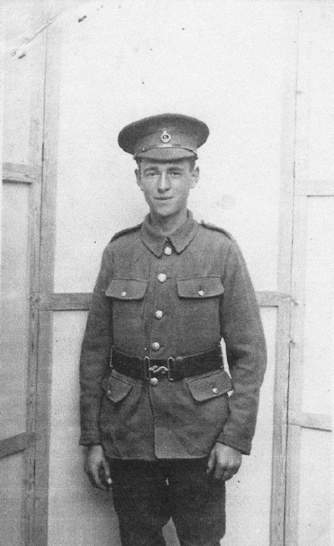Name
Jack Alfred Willmott
1895
Conflict
First World War
Date of Death / Age
31/07/1917
22
Rank, Service Number & Service Details
Private
266667
Hertfordshire Regiment
1st/1st Bn.
Awards: Service Medals/Honour Awards
British War and Victory medals
Cemetery/Memorial: Name/Reference/Country
DUHALLOW A.D.S. CEMETERY
I. A. 43.
Belgium
Headstone Inscription
DEEPLY MOURNED AND SADLY MISSED BY ALL WHO LOVED HIM
UK & Other Memorials
Hertfordshire Regimental Memorial, All Saints Church, Hertford, Letchworth Town Memorial, St Mary's Church Roll of Honour, Ashwell, Not on the Ashwell memorial
Pre War
Jack Willmott was born in Ashwell, Hertfordshire in 1895, the son of George and Jennie Willmott (nee Mehew). One of seven children, he was educated at the Merchant Taylors School in Ashwell. His father was a successful bricklayer and builder by trade, and his work took him wide and far.
On the 1901 Census the family home was in High Street, Ashwell, where Jack lived with his parents, five siblings, Reg, Mabel, Winnie, Cyril, Gladys, and a domestic help, Ada Dellar. His father was then working as a builder and job master, but by the time Jack was 16, the family had moved from Ashwell and were living at 36 Canterbury Road, West Worthing in Sussex. Between 1911 and 1915, the family moved on at least two more occasions, firstly, to the Old Manor House, Wrestlingworth, Bedfordshire, and later to Asylum Road, Springfield, Stotfold, Bedfordshire.
Wartime Service
Jack enlisted in Hertford on 31 May 1915 and initially served with “A” Company, 3rd/1st Battalion, Hertfordshire Regiment, and went to Windsor for basic training. On 3 September 1915, he was brought before the company commanding officer on a charge of causing a disturbance in his tent the previous day. The witness, Corporal Clements, gave details of the offence and Jack was confined to barracks for seven days. The battalion moved to Halton Park in Buckinghamshire, and on 21 October, Jack was again charged with not complying with an order that day. For his disobedience, Jack was again confined to his barracks, this time for four days.
He was sent to France on 13 March 1916 leaving from Southampton and arriving in Le Havre the following morning. Less that two months later, on 2 May 1916, Jack witnessed the death of his friend, Thomas Cummings, being killed, believed to have been shot by a sniper, after the Battalion moved into front-line trenches to relieve the 12th Battalion, Royal Sussex Regiment.
Jack's Battalion took part in latter stages of the Battle of the Somme and Battle of the Ancre which began on 13 November 1916.
On 18 February 1917, Jack was admitted to the 134th Field Ambulance suffering with diarrhoea, a condition treated very seriously by the Army at the time, and fast tracked to a Casualty Clearing Station for treatment. He arrived back with his Battalion on 23 April 1917, following nine weeks of treatment and recuperation.
Jack died of wounds at St Juliaan on 31 July 1917. He was hit in both legs by machine gunfire, probably during the early stages of the attack. He would have been carried to a Regimental Aid Post, and from there to the Divisional Collecting Post. Due to the condition of the ground it was extremely difficult for a motor ambulance to get the wounded to the Advanced Dressing Station at Dulhallow. It is likely Jack would have been carried over two miles on a stretcher by a team of bearers, a long and exhausting journey. Despite their best efforts, Jack died just 30 minutes after arriving at the Dressing Station.
He is buried in Duhallow A.D.S. [Advanced Dressing Station] Cemetery, Belgium.
Additional Information
His mother received a war gratuity of £9 10s and pay owing of £4 13s 7d. Pension cards exist with his mother as dependant but do not show how much she received.
Jack's extensive biography by Paul Johnson can be found in this website's HAW Archive section HERE
Acknowledgments
Jonty Wild, Brenda Palmer
Adrian Pitts, Jonty Wild, Paul Johnson, www.ashwellmuseum.org.uk



